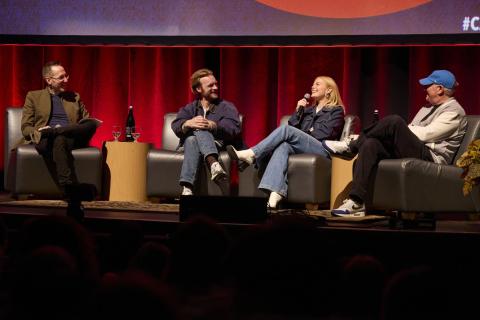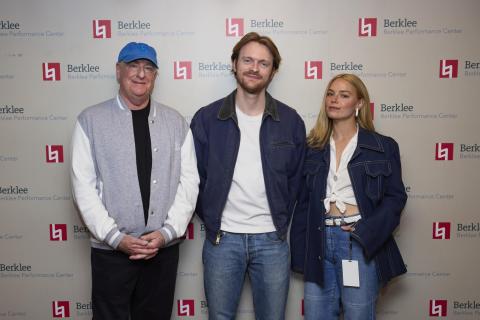FINNEAS and Ashe Talk Confidence and Collaboration in the Music Industry

Left to right: Songwriting Department Assistant Chair Jonathan Perkins, FINNEAS, Ashe BM 15, and Paul Wachter shared the Berklee Performance Center stage during this year's Career Jam keynote panel discussion.
Image by Kelly Davidson
Fresh off an Oscar win for Best Original Song with his sister, Billie Eilish, and days before the announcement of Eilish’s new album, Hit Me Hard and Soft, songwriter and producer FINNEAS took the stage at this year’s Career Jam, Berklee’s annual career festival, for a conversation with two long-time collaborators. Joining him onstage were singer-songwriter Ashe BM ’15, whose breakout hit “Moral of the Story” (coproduced by FINNEAS) was featured prominently in the Netflix film To All the Boys: P.S. I Still Love You; and businessman Paul Wachter, founder and CEO of Main Street Advisors, who helped make the crucial connection that brought FINNEAS and Billie Eilish into the Barbie soundtrack, which led to this year’s Academy Award.
Listen to 'Moral of the Story by Ashe, cowritten and coproduced by FINNEAS.
Each panelist readily acknowledged their Berklee connections and affections. Ashe spoke consistently to the crowd about her Berklee experience (“CWP, anybody? Yeah! You can’t say that anywhere but here,” she joked at one point), and she explained how her classes in big band and orchestra writing influenced her approach to songwriting. FINNEAS recalled learning music techniques in high school from watching videos on Berklee’s YouTube channel. And Wachter, a member of Berklee’s Board of Trustees and founder of the school’s Wachter Fellowship program, talked about the uncommon energy and sense of community he finds whenever he comes to campus.
In a conversation moderated by Jonathan Perkins, assistant chair of the Songwriting Department, the panelists discussed the value of confidence and authenticity, the crucial role of collaboration in music-making and business, and the realities of life in the music industry. FINNEAS also offered insight into his approach to producing the new Billie Eilish album alongside his sister.
Collaboration in Art and Business

Left to right: Paul Wachter, FINNEAS, and Ashe at Career Jam 2024
Image by Kelly Davidson
Collaboration was this year’s Career Jam theme, and it especially shined through in the panel’s conversation. FINNEAS discussed how the collaborative dynamic with his sister Billie has evolved over the years. He noted that when they made her first album (When We Fall Asleep, Where Do We Go?), he sat in a chair at his computer and she sat on his bed with a microphone; then on the second album (Happier than Ever), she sat on a couch and he was at the desk; and finally, working on her upcoming third album, Hit Me Hard and Soft, their collaboration was more like “the two of us at the desk, like copilots on an airplane.”
“I made a point to teach her over the last two records how to do all her vocal engineering,” he said, describing his sister’s extremely meticulous process of selecting the perfect vocal takes for her songs. “She is an incredible vocalist, and I am but a puppet if I'm comping with her.”
FINNEAS went on to talk about his role as a producer and a songwriter in other scenarios, saying, “I try to fill the empty space, you know? Sometimes, you get in the room with an artist, and they fill like 99 percent of it. And that's awesome. . . . And sometimes you get in the room and somebody, even if they're incredibly talented and they can sit and write songs on their own, and that day they're just like, ‘I want a lot of help.’ That's the other thing. It's different day to day.”
Ashe was able to speak about her own years of producing and cowriting music with FINNEAS. “We've done a lot together,” she said, and then turned to speak to him directly about one specific instance: “I was working on my first album [Ashlyn], and I wrote the bones of ‘Till Forever Falls Apart’ . . . I texted you and asked just to ask you if you wanted to be a part of it, and you rewrote the second verse,” which she said, self-deprecatingly, became “the best lyrics of the song.” The song became the album’s opening track, “and we got to do all this amazing promo together [for the song]. You just hang with your buddy. It was so good.” From a professional standpoint, collaboration is essential to everyone in this industry, but as the panelists showed, it can also be an excellent opportunity to meet people and spend time with friends.
Watch the music video for "Till Forever Falls Apart" by Ashe and FINNEAS:
Of course, collaboration takes many different forms throughout the industry. Wachter, whose professional network includes numerous Hollywood creatives, described hearing about the Barbie movie soundtrack as it was coming together, and realizing that Billie Eilish and FINNEAS would be a perfect fit. “It seemed to me that they were missing a song like that ['What Was I Made For']. They needed . . . a serious, great song. They had a lot of dance numbers. I'm not a musician like they are, but I know enough to say, ‘Okay, I know who this is perfect for.’ And that is collaboration,” he said. “I'm not writing a song, but I'm at least out there in the world thinking about the people I work with and what opportunity that I'm hearing about or that I'm seeing is right for a certain person.”
“If you're songwriters, or performers, or producers, or business people, whatever you are, you're going to meet people who are potential collaborators and partners for you,” said Wachter about the importance of choosing the right people to work with. “Look for someone who compliments you, meaning they have skills that you don't have. . . . It's very hard to do anything alone. And it's very hard to succeed alone.”
The Confidence to Sing, or to Sit Back
In this line of work, confidence, bravery, and tenacity are crucial for survival, but they’re also skills that can be developed over the course of an artist’s career. Ashe talked about how when she was starting out, especially as a student at Berklee, she perceived herself as an “insecure little girl.” She gave credit to her vocal coach, Voice Professor Patrice Williamson, for encouraging her in those early days and slowly helping her build confidence.
After graduating, Ashe moved to Nashville, thinking she would write songs exclusively for other musicians. “I told everyone I would never be an artist, but that I would be a great songwriter,” she said. “And then halfway through Nashville, I kept meeting all these artists who were like, ‘I've got it.’” Faced with the confidence and boldness of those colleagues, something clicked. “I was like, ‘No, I've got it.’ And it worked!” She realized she had a desire to prove herself, and to sing her own songs. “I kind of got bored of being so insecure, and then the world opened up.”
FINNEAS explained how developing confidence and self-assurance in his role as a producer also gave him the freedom to say less and listen more—to know when to let his collaborators take the lead. “If I'm in a room where somebody's really cooking, like I'll just sit back,” he said. “To me, that's about confidence. If you have confidence in yourself, you have confidence to just be like, ‘They're coming up with great ideas. I can just sit here and support them.’”
You just have to get quiet and stay still just long enough to hear yourself think.
—
Finding What ‘Fits You’
Life can be hard for anyone, but it gets even more complicated for performers, who step into a world where everyone knows and sees what they do. Remaining authentic to oneself becomes difficult while managing the expectations of collaborators, audiences, and onlookers. During the panel conversation, Ashe discussed how, after taking a break to focus on self-care, she is now getting ready to release new music. With this comes preparing for the increased attention and public scrutiny it will bring. "The world is loud, and it's mean, and it's getting meaner. . . . You just have to get quiet and stay still just long enough to hear yourself think,” she said.
When asked by an audience member about her songwriting practice, Ashe emphasized the importance of staying true to her own experience. “I think, really, you just have to have fun—or not have fun—and just be yourself.” She acknowledged that good songs can emerge from difficult places, but there is still potential for enjoyment in the process: “[Or] be miserable—write the saddest freaking [song] . . . Write about your experiences, see what shows up, and have fun.”
FINNEAS spoke about this subject as well, explaining his sense that a musician can have a sense of what “fits you” while also exploring ideas that might make more sense if they were given to others. “You see some mannequin wearing a cool outfit, and you go try it on, and you're like, ‘Well, not on me.' . . . It has to fit you, you know? It has to feel good on you. And I think one of the ways I knew I was a producer and a cowriter was I would make stuff that did not fit me.”
He told the story of Billie Eilish’s breakout single “Ocean Eyes” as an early example of this experience: “My band played this horrible-sounding, sort of Soundgarden-esque version of ‘Ocean Eyes,’ and I remember being on stage like, ‘This f*cking sucks.’ And I went home and said, 'Billie, you would sound so good singing this song.’ [And] she sounded so good singing this song. And it was like, ah, this wasn't for me, ever. It was never for me.”
That sense of personal “fit” goes all the way down to the decision to pursue music in the first place. FINNEAS recalled seeing Green Day in concert for the first time as an 11-year-old, being blown away by the show, and thinking, “Well, that's clearly the best job . . . now all I have to do is learn how to play instruments.” As he eventually grew into that career, making what would become chart-topping, award-winning music in his bedroom with his sister, and later with collaborators including Ashe, he discovered that even the difficult parts of the job felt worth doing. “Here's the career advice, above all other career advice,” he told the Berklee students in the audience. “Pick the thing where every sh*tty step is pretty exciting to you.”
